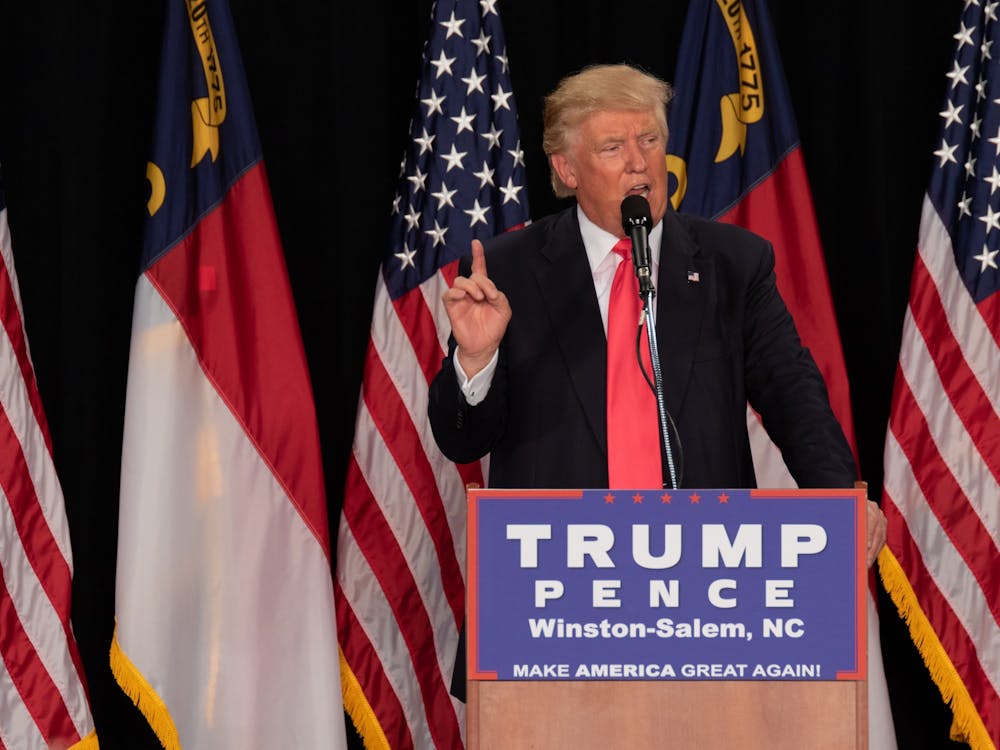Donald Trump’s tweets have already been the subject of scrutiny, but now his word choice and speaking style are under examination.
Linguists are analyzing President Donald Trump’s language, which often departs from typical political speech and includes divisive and derogatory language, to understand how his rhetoric reflects ideas of masculinity to gain support for his presidency.
“The Trump era feels like a political emergency to many but it also feels like a linguistic one,” said Norma Mendoza-Denton, a professor of anthropology at the University of California, Los Angeles, at a Monday virtual event.
Mendoza-Denton presented the event “Crying, Control, and Masculinity in the Language of Donald Trump”, detailing ideas about Trump’s use of language from her new book “Language in the Era of Donald Trump: Scandals and Emergencies,” which was published in September and which she co-edited.
Trump’s speech relies on simple words, focuses on his opinions and actions and presents himself as a masculine figure to contrast so-called “snowflake” liberals and career politicians, Mendoza-Denton said.
Following the 2016 presidential debates, “Trump scored particularly well on measures of authenticity,” she noted. “Trump supporters saw the new political order they hoped for.”
While much of the talk focused on language, Mendoza-Denton also rebutted claims that Trump may be experiencing early stages of dementia. She argued that having heard recordings of Trump talking to attorneys and others behind the scenes, he had displayed a level of knowledge of business contracts and other details that would be uncommon with dementia.
Mendoza-Denton contrasted the typical way politicians launch speeches with how Trump begins his own. Generally, politicians begin with discourse markers like “well” or “now” to shift the subject, while Trump generally begins question responses with “I”.
“Putting his opinions front and center may have implied a decisive style of governance,” Mendoza-Denton said to explain the appeal of his direct style. “Trump’s authoritative voice and way of speaking have built his image as a ‘man who knows better.’”
This idea of being a man in charge has been integral to the political right in recent years. “The Republican Party fashions itself as the party of the stern father figure, while the Democrats are more akin to a protective and indulgent mother,” she said.
To illustrate Trump’s view of masculinity, Mendoza-Denton referenced a narrative of masculinity from Trevor Noah of The Daily Show, compiled into the satirical Christmas video, “Trump’s Mythical Crying Man Yule Log.”
In the video, there are fifteen instances of Trump speeches that contain the same story of a “strong, tough guy,” often a steel worker, crying while complimenting Trump on how his presidency has saved America.
Mendoza-Denton also discussed ways Trump used with his speech to create division, especially in his 2016 campaign.
Phrases such as “USA,” “Lock her up,” “Get them out,” and “Send her back” were common during the 2016 election and many continue to be used at Trump rallies today. Common chants for rallies held by candidates on the left are longer, with wordier content of “traditional civil-rights era street chanting,” Mendoza-Denton.
Trump often uses ‘the’ before a noun describing a group “others” subgroups like “the women” “the gays” and “the blacks.”
This way of speaking about groups “delineates and pigeonholes the group both to homogenize the group and to distance the group from the speaker, making the group into a differentiated ‘other,’” Mendoza-Denton said.
Mendoza-Denton talked about how Trump’s rhetoric against Latin Americans, specifically Mexican immigrants, led “bad hombres” to become a term used in discussing immigration during the 2016 election.
Despite this rhetoric, Trump has managed to sustain some support from the Latinx community throughout his presidency thanks to other messaging, she said.
“Latino men saw Trump come in and be a boss, and they liked it because it fit in with their idea of masculinity. I cannot discount that this is part of his appeal,” Mendoza-Denton said.
“We can’t go on believing that 40% of the population is just wrong,” she said as a call to action for sponsoring respectful dialogue. “We have to try to understand where everyone is coming from.”
Get The Chronicle straight to your inbox
Signup for our weekly newsletter. Cancel at any time.

Paige Carlisle is a Trinity senior and a staff reporter for The Chronicle.

